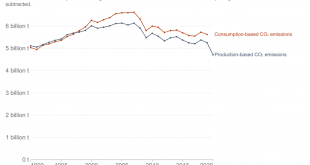from Ikonoclast (originally a comment) Comments are declining on this blog. People ARE hiding in their holes. Holes can be comfortably furnished. Just ask a hobbit. Of course, when the holes cease to be furnished and the supermarket shelves are empty then things get a little less comfortable. You will note I wrote, “Every well thought out effort at sustainability postpones catastrophe a little bit.” That is the essential nature of life in an existentialist sense: postponing catastrophe...
Read More »Making sense of economics
from Lars Syll Robert Lucas, one of the most creative model-builders, tells a story about his undergraduate encounter with Gregor Mendel’s model of genetic inheritance. He liked the Mendelian model—“you could work out predictions that would surprise you”—though not the lab work breeding fruit flies to test it. (Economists are not big on mucking around in the real world.) Over the weekend, he enjoyed writing a paper comparing the model’s predictions with the class’s experimental results....
Read More »The idea of progress seems one of the theoretical presuppositions of modernity.
from Ken Zimmerman (originally a comment) Uneconomic growth is growth that produces negative externalities which reduce the overall quality of life. This is also known as unsustainable growth, where the negative social and environmental consequences outweigh the short-term value of an extra unit of growth, making it uneconomic. But in spite of this quandary growth remains the primary goal. It holds that place because growth is equated with progress. The idea of progress seems one of the...
Read More »Why economics is not an ecological science?
from Gregory A Daneke and WEA Commentaries As an academic discipline economics has actually been organized to have little use for the concepts of ecology (especially: population biology, systemic science, ethology, natural history or biogeography). With the rise of Neoclassical economics, it was specifically designed to be a sterilized, frictionless, and hermitically sealed void in which to suspend economic activity. But of course, this a-societal, a-political, a-historical enterprise...
Read More »A golden age of macro-economic statistics 2. Macro-based CO2 emissions.
I love the national accounts (NA). The NA focus on the money-economy. Total wages (who pays, who receives), profits, imports, exports, consumption, bank credit, the value and ownership of fixed and financial capital and (on the other side of the sectoral balance sheets) debts. By focusing on different kinds of money flows and stocks and by tracking flows between sectors the national accounts enable us to map the relations between economic sectors like construction and industry...
Read More »Weekend read – Combatting Global Warming: The Solution to China’s Demographic “Crisis”
from Dean Baker There have been numerous news articles in recent years telling us that China faces a demographic crisis. The basic story is that the market reforms put in place in the late 1970s, together with the country’s one-child policy, led to many fewer children being born in the last four decades. As a result, the number of current workers entering retirement exceeds the size of the cohorts entering the workforce, leading to a stagnant or declining workforce. This is supposed to be...
Read More »What was Between Carroll Baker and James Dean?
Business email: [email protected] Music in the video: -"Mining by Moonlight" Kevin MacLeod (incompetech.com) Licensed under Creative Commons: By Attribution 4.0 License http://creativecommons.org/licenses/by/4.0/ Music wanted!! If you are a music producer and would like me to use your music please email me at [email protected]
Read More »Wealth inequality explained
from Lars Syll [embedded content]
Read More »The global divergence gets bigger
from C. P. Chandrasekhar and Jayati Ghosh The Covid-19 pandemic operated to expose various global inequalities in their stark form, but it has also further accentuated them at unprecedented scale and speed. The latest World Economic Outlook from the IMF, released in late October 2021, provides further evidence of how the global divide has increased through the course of the pandemic, most of all the gap between advanced economies and the rest of the world. On the face of it, in terms of...
Read More »The logic of financial markets
from Lars Syll Professional investment may be likened to those newspaper competitions in which the competitors have to pick out the six prettiest faces from a hundred photographs, the prize being awarded to the competitor whose choice most nearly corresponds to the average preferences of the competitors as a whole; so that each competitor has to pick not those faces which he himself finds prettiest, but those which he thinks likeliest to catch the fancy of the other competitors, all of...
Read More » Real-World Economics Review
Real-World Economics Review





